Synbio is a diverse field with diverse applications, and the different contexts (e.g., gain-of-function research, biofuels) raise different ethical and governance challenges. The objective of this course is to increase learners’ awareness and understanding of ethical and policy/governance issues that arise in the design, conduct and application of synthetic biology. The course will begin with a short history of recombinant DNA technology and how governance of that science developed and evolved, and progress through a series of areas of application of synbio.

Engineering Life: Synbio, Bioethics & Public Policy

Engineering Life: Synbio, Bioethics & Public Policy

Instructor: Debra JH Mathews, PhD, MA
8,974 already enrolled
Included with
80 reviews
Skills you'll gain
Details to know

Add to your LinkedIn profile
See how employees at top companies are mastering in-demand skills

There are 6 modules in this course
What's included
1 video1 reading1 discussion prompt
We start the course by learning a bit about the history and context of the development of recombinant DNA (rDNA) technology in the 1970s, the ethics and policy issues raised by that science, and how those issues remain with us today in synthetic biology. The work of the week includes lecture videos, readings, and an interview with LeRoy Walters, who was involved in the discussions and debates about rDNA in its early years. The week will conclude with a quiz.
What's included
8 videos1 reading1 assignment1 discussion prompt
In Week 2 we will learn about and discuss gain of function (GOF) research and the dual-use concerns raised by synthetic biology. The work of the week includes lecture videos, a number of outside videos, and readings. The assessment this week will be your first peer-assessed project, and will focus on identifying ethical duties related to GOF research policy.
What's included
6 videos2 readings1 peer review2 discussion prompts
This week, we’ll learn about biofuels, the complex task of balancing the many ethical issues they raise, and the role of synthetic biology in biofuels development. The work of the week includes lecture videos, one outside video, readings, and an interview with Deborah Scott about biofuels governance. The week will conclude with a quiz.
What's included
7 videos2 readings1 assignment2 discussion prompts
This week we will learn a bit about applications of synthetic biology to human health, and the ethics of human subjects research. The work of the week includes lecture videos, one outside video, and readings. The assessment this week will be your second peer-assessed project, and will build on your first project, from Week 2. This project will focus on identifying stakeholders in a policy decision, their interests in the decision, and the related ethical duties of the decision-maker.
What's included
7 videos2 readings1 peer review2 discussion prompts
In the final week of the course, we will talk about both models of governance for emerging biotechnologies and the role of public engagement in the development and oversight of the science. The work of the week includes lecture videos, one outside video, and readings, as well as interviews with LeRoy Walters and Jane Calvert. The final course project builds on the Week 2 and 4 peer-assessed projects, and goes a step further, asking you to develop and defend a decision-making process for a government policy related to the release of genetically modified mosquitoes.
What's included
8 videos2 readings1 peer review2 discussion prompts
Instructor

Offered by
Explore more from Public Health
 Status: Preview
Status: PreviewAmerican Museum of Natural History
 Status: Preview
Status: PreviewUniversity of Cambridge
 Status: Free Trial
Status: Free TrialUniversity of Colorado Boulder
 Status: Preview
Status: PreviewUniversity of Manchester
Why people choose Coursera for their career

Felipe M.

Jennifer J.

Larry W.

Chaitanya A.
Learner reviews
- 5 stars
60%
- 4 stars
18.75%
- 3 stars
7.50%
- 2 stars
3.75%
- 1 star
10%
Showing 3 of 80
Reviewed on Sep 11, 2018
Dr. Matthews is a fantastic instructor; Slide deck is great.
Reviewed on Nov 5, 2020
Great course! Learn a lot of new information about governance in Synbio.
Reviewed on Nov 6, 2019
pretty good class. kind of technical but gives one some good stuff to think about

Open new doors with Coursera Plus
Unlimited access to 10,000+ world-class courses, hands-on projects, and job-ready certificate programs - all included in your subscription
Advance your career with an online degree
Earn a degree from world-class universities - 100% online
Join over 3,400 global companies that choose Coursera for Business
Upskill your employees to excel in the digital economy
Frequently asked questions
The primary goal of this class is to help scientists think a bit more like policy makers and the public, seeing not only the incredible promise of the science they do, but also the potential risks and pitfalls, so these can be avoided or designed against at the beginning of a project, rather than at the end, when the challenges and costs are higher. Working with scholars, policy makers, and fellow learners, students will gain a greater understanding and appreciation of the ethics and governance of synthetic biology.
To access the course materials, assignments and to earn a Certificate, you will need to purchase the Certificate experience when you enroll in a course. You can try a Free Trial instead, or apply for Financial Aid. The course may offer 'Full Course, No Certificate' instead. This option lets you see all course materials, submit required assessments, and get a final grade. This also means that you will not be able to purchase a Certificate experience.
When you purchase a Certificate you get access to all course materials, including graded assignments. Upon completing the course, your electronic Certificate will be added to your Accomplishments page - from there, you can print your Certificate or add it to your LinkedIn profile.
More questions
Financial aid available,
¹ Some assignments in this course are AI-graded. For these assignments, your data will be used in accordance with Coursera's Privacy Notice.

